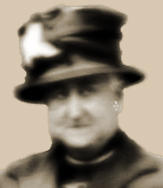"So almighty womanish..."
The Evil Virus having returned with a vengeance after two weeks' respite - although masquerading this time as a head cold rather than, as previously, having pretensions to influenza - Lady Bracknell finds herself once again confined to Bracknell Towers. Having taken some rather elderly decongestant tablets which, after a great deal of (literally) fevered searching, she eventually tracked down in a dusty corner of the bathroom, her ladyship finds herself beset by random memories of years gone by.
If her concentration will hold, she will endeavour to convey these to her readers in a manner which has some degree of logical stucture.
Some decades ago, when the young Lady Bracknell was reading for her degree at one of our country's most highly-respected seats of learning, Thomas Hardy's Far From The Madding Crowd was one of the texts she studied for her optional "Themes of redemption in Literature" finals paper. Said classic text contains a description of Bathseba Everdene which has always stayed in her ladyship's memory.
Bathsheba is wholly infatuated with the outwardly charming Sergeant Troy but, knowing that his character is not generally respected, is tormented by her feelings towards him. She tells her servants that she hates him. When they agree with her that he is indeed hateful, she rails against them for judging the poor man so harshly. Ultimately, she threatens to dismiss her maid, Liddy, should the poor girl ever repeat the private conversation the two have had about the tortures of being a woman in love. Quickly repenting of this threat, she asks Liddy a question:
"I hope I am not a bold sort of maid -- mannish?"
Liddy replies:
"Oh no, not mannish; but so almighty womanish that 'tis getting on that way sometimes".
Lady Bracknell anticipates that it will come as no surprise to her regular readers - nor, indeed, to anyone who has read Mr Wilde's play - that she is constitutionally incapable of behaving in a demure, simpering and girlish manner. Nevertheless, she refuses to accept the universally held axiom that only such women who concern themselves with powder, paint and uncomfortably elegant shoes - and who subjugate their own wishes to those of whichever man is their current companion - are worthy of the epithet "feminine". There is, she believes, a great deal of more worth to celebrate about womankind than their ability to ensure that The Men always have clean underpants.
Forthright ladies with strong opinions - opinions which they do not shrink from expressing publicly and with no little vehemence - all risk being accused of behaving in an "unfeminine" manner. Lady Bracknell does not really give a fig whether she is considered unfeminine, but neither does she believe that her character is in any way masculine. She believes "almighty womanish" to be as good a description as any.
The above preamble being out of the way, Lady Bracknell wishes to record two occasions on which young ladies have spoken their minds without prevarication and in a manner which would probably not be considered as meeting the feminine ideal. Feminine or not, however, Lady Bracknell believes their responses to have been entirely female.
The first anecdote dates back once again to Lady Bracknell's days as an undergraduate. Every October, the new influx of students to the city in question would galvanise the local flashers into action.
The young gel of whom Lady Bracknell speaks was but eighteen years of age, and had vacated the bosom of her family less than a week prior to the event in question. Consider, then, the admirable presence of mind required to respond calmly, upon being presented somewhat forcefully with a dangling male appendage, with the words, "Yes, I see. Are you boasting or complaining?".
Some years after this, Lady Bracknell was in conversation with Panayiotta, a young Greek Cypriot woman of her acquaintance. It is, of course, true that Greek persons are generally more direct in their speech than are their British counterparts. Nevertheless, the following - to employ the modern idiom - "takes some beating".
In their teens and twenties, forceful women often find themselves doggedly pursued by otherwise passive young men who would willingly leap to do their every bidding. This sort of adoration can quickly become exceedingly tedious, particularly when what one wants is someone with whom one can interact on equal terms rather than a whipping boy.
Panayiotta, faced with one such individual who had proved himself impervious to subtle hints, eventually dismissed him with the words,
"Yes. I think I've reached the end of your personality now".
(Admirers of her ladyship - should any exist - who are uncertain of their capacity to fascinate her indefinitely, would be advised to bear in mind that it has long been her ambition to have the opportunity to repeat this inspired line herself.)
If her concentration will hold, she will endeavour to convey these to her readers in a manner which has some degree of logical stucture.
Some decades ago, when the young Lady Bracknell was reading for her degree at one of our country's most highly-respected seats of learning, Thomas Hardy's Far From The Madding Crowd was one of the texts she studied for her optional "Themes of redemption in Literature" finals paper. Said classic text contains a description of Bathseba Everdene which has always stayed in her ladyship's memory.
Bathsheba is wholly infatuated with the outwardly charming Sergeant Troy but, knowing that his character is not generally respected, is tormented by her feelings towards him. She tells her servants that she hates him. When they agree with her that he is indeed hateful, she rails against them for judging the poor man so harshly. Ultimately, she threatens to dismiss her maid, Liddy, should the poor girl ever repeat the private conversation the two have had about the tortures of being a woman in love. Quickly repenting of this threat, she asks Liddy a question:
"I hope I am not a bold sort of maid -- mannish?"
Liddy replies:
"Oh no, not mannish; but so almighty womanish that 'tis getting on that way sometimes".
Lady Bracknell anticipates that it will come as no surprise to her regular readers - nor, indeed, to anyone who has read Mr Wilde's play - that she is constitutionally incapable of behaving in a demure, simpering and girlish manner. Nevertheless, she refuses to accept the universally held axiom that only such women who concern themselves with powder, paint and uncomfortably elegant shoes - and who subjugate their own wishes to those of whichever man is their current companion - are worthy of the epithet "feminine". There is, she believes, a great deal of more worth to celebrate about womankind than their ability to ensure that The Men always have clean underpants.
Forthright ladies with strong opinions - opinions which they do not shrink from expressing publicly and with no little vehemence - all risk being accused of behaving in an "unfeminine" manner. Lady Bracknell does not really give a fig whether she is considered unfeminine, but neither does she believe that her character is in any way masculine. She believes "almighty womanish" to be as good a description as any.
The above preamble being out of the way, Lady Bracknell wishes to record two occasions on which young ladies have spoken their minds without prevarication and in a manner which would probably not be considered as meeting the feminine ideal. Feminine or not, however, Lady Bracknell believes their responses to have been entirely female.
The first anecdote dates back once again to Lady Bracknell's days as an undergraduate. Every October, the new influx of students to the city in question would galvanise the local flashers into action.
The young gel of whom Lady Bracknell speaks was but eighteen years of age, and had vacated the bosom of her family less than a week prior to the event in question. Consider, then, the admirable presence of mind required to respond calmly, upon being presented somewhat forcefully with a dangling male appendage, with the words, "Yes, I see. Are you boasting or complaining?".
Some years after this, Lady Bracknell was in conversation with Panayiotta, a young Greek Cypriot woman of her acquaintance. It is, of course, true that Greek persons are generally more direct in their speech than are their British counterparts. Nevertheless, the following - to employ the modern idiom - "takes some beating".
In their teens and twenties, forceful women often find themselves doggedly pursued by otherwise passive young men who would willingly leap to do their every bidding. This sort of adoration can quickly become exceedingly tedious, particularly when what one wants is someone with whom one can interact on equal terms rather than a whipping boy.
Panayiotta, faced with one such individual who had proved himself impervious to subtle hints, eventually dismissed him with the words,
"Yes. I think I've reached the end of your personality now".
(Admirers of her ladyship - should any exist - who are uncertain of their capacity to fascinate her indefinitely, would be advised to bear in mind that it has long been her ambition to have the opportunity to repeat this inspired line herself.)











6 Comments:
Having been retained in Your Ladyship’s employ for many years now, I am reasonably convinced that this has more to do with my prowess as driver and general handyman than because I am endlessly fascinating. Therefore, ma’am, may one assume that household staff are exempted from the need to strive to be even finitely fascinating in your presence?
After all, I have seen several of your most ardent suitors arrive and depart and, although I have no designs on Your Ladyship’s heart or hand myself, I would prefer to know if I am living on borrowed time!
The Dude can rest assured that Lady Bracknell does not consider a capacity to be infinitely (or even finitely) fascinating to be a key criterion for a position in her employ.
Indeed, should the Dude make any attempt to work his own peculiar brand of fascination upon her ladyship, he would risk summary dismissal.
Lady Bracknell frowns on the merest suspcicon of unsuitable liaisons between the upper classes and those fortunate enough to have been engaged to work for them.
In that case m'lady, I shall restrict myself to fascinating the cook downstairs until you need me.
Bliss 'tis, to read this !
I have to admit m'lady that most of what you say is true. I also rather humbly confess to being scared witless by the 'almighty womanish' ladies of which you tell. I do believe that for some 10 years this fair Isle was governed by an 'almight womanish' PM who certainly wasn't shy in stamping out her 'almighty womanish' authority on the humble working man. Or was she indeed more 'mannish?' Confused of Little Hampton.
Lady Bracknell fears she must insist that Mr Mac washes his mouth out with soap and water this instant!!
Mrs Thatcher was most decidedly not "almighty womanish": she behaved like a man.
There was a deplorable tendency in the 1980s for women in business to assume the worst traits of the male gender in order to "get on". These women adopted tactics such as aggression, bullying, arrogance and intimidation to compete with their male colleagues.
Lady Bracknell believes that she read somewhere that some of them actually began to experience male pattern baldness as a result of increased testosterone levels, but this may have been an urban myth...
Post a Comment
<< Home